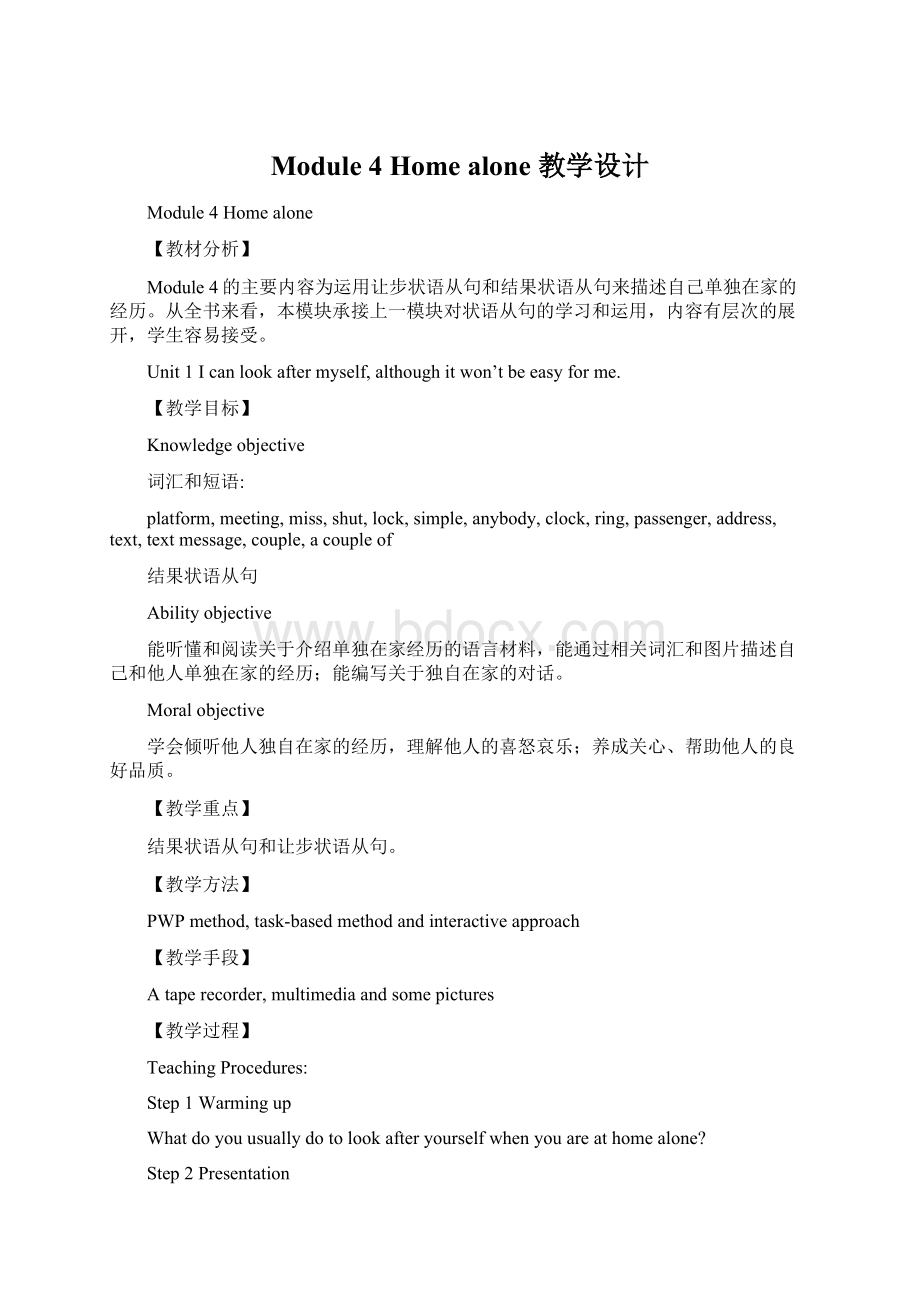Module 4 Home alone 教学设计Word格式.docx
《Module 4 Home alone 教学设计Word格式.docx》由会员分享,可在线阅读,更多相关《Module 4 Home alone 教学设计Word格式.docx(13页珍藏版)》请在冰豆网上搜索。

【教学过程】
TeachingProcedures:
Step1Warmingup
Whatdoyouusuallydotolookafteryourselfwhenyouareathomealone?
Step2Presentation
Theteachersshowsthepicturesofnewwordsorexpressionsandletthestudentstosayasquicklyaspossible.
Step3Workinpairs.Talkaboutthepicture
Lookatthepictureandtalkaboutwhattheywilldoinpairs.
Step4Listening
1.ListentoPart2andanswerthequestions.
1)WhereareBettyandherparents?
2)IsBettytravellingwithherparents?
2.FinishActivity3.Listenagainandcompletethesentences.
Step5Reading
1.Listenandanswerthefollowingquestions.
1)WhoisleavingforLhasa?
2)Howdotheygothere?
2.Readandcompletethesentences.Theremaybemorethanoneanswer.
1)Betty’sparentsaregoingto______.
2)Herparentstellherto_______________.
3)Bettycan__________.
4)Betty’sparentsusually__________.
5)Betty’smumhasnot_____________.
3.Actoutthedialogueingroupsaccordingtothefollowingwords.
Mum:
trainnumber,meeting,thedoor,plentyoffreshfruitandvegetables,giveour
address
Dad:
wakeup
Betty:
twoweeksofschool,lookaftermyself,cooksimplemeals,textmessage
Step6Languagepoints
1.SoamI,butIcan’tmisstwoweeksofschool.
SoamI承接上一句贝蒂妈妈说的话:
…I’msorryyoucan’tcomewithus,Betty.(贝蒂,你不能和我们一起去,很遗憾),表示“我也很遗憾无法同行”。
“So+be/助动词+主语”这一结构表示自己与前一个人的情况相同或同意一个人的说法,意思是“……也这样”。
e.g.Joewasalittleupset,andsowasI.乔有点不开心,我也有点儿。
Hehasbeenill,andsohashiswife.他一直生着病,他妻子也一样。
Neilleftjustaftermidnight,andsodidJack.
尼尔一过午夜就走了,杰克也是。
missv.未出席;
未出现
出现动词时,应该用动词的-ing形式。
e.g.Getupearlyoryouwillmisstheearlybus.
ShemissedgoingtothepartyonSaturday.
miss作动词还有“想念”的意思。
miss作名词意为“女士;
小姐”,此时m必须大写,常用于姓名或姓之前,尤指未婚女子。
如:
MissBrown。
2.Therewon’tbeanybodytowakeyouupinthemorning.
anybodypron.任何人
常用于否定句或疑问句中;
当用于肯定句
中时,相当于anyperson,意为“任何人”
e.g.Iwillnottellanybodythesecret.
Isthereanybodyintheoffice?
Anybodycoulddoit!
3.Myclockringsoloudlythatitwillcertainlywakemeup.
ringv.鸣响;
发出铃声
e.g.The
telephone
is
ringing.电话铃响了。
ring作动词还有“打电话”的意思。
e.g.I’llringyouupassoonastheyarrive.他们一到我就给你打电话。
4.Yourtrainisabouttoleave.
beabouttodosth.的意思是“就要/正要……”.
e.g.WewerejustabouttoleavewhenJerryarrived.
杰里来的时候,我们正准备走。
Shelookedasifshewasabouttocry.
她看上去好像要哭了。
5.Seeyouinacoupleofweeks!
couple作名词,意为“一对;
两个”。
它常用于固定短语acoupleof,表示“两个”。
e.g.Shehasacoupleoffriendsatschool.她在学校有两个朋友。
辨析:
couple/pair
这两个名词均有“一对;
两个”之意。
couple多指在一起或彼此有关系的两个人或两个同样的事物;
pair含义广泛,可指人或物,用于物时,指两个互属的事物,缺此或失彼都会失去使用价值,或指由相对称的两部分构成的一件东西。
e.g.Ifoundacoupleofsocksinthebedroombuttheydon’tmakeapair.
Step7Practice
Choosethecorrectanswer.
Readthesentencesandgettheideasofthewordsinthebox.
addresslockmeetingpassengerringshuttextmessage
1.“Ihaven’tgivenyououraddressinLhasa!
”Thismeansyoudonotknowwherewearestaying/whatwearedoing.
2.Youseepassengerstravellingbytrain/stayingathome.
3.Whenyourclockrings,itisquiet/makesaloudnoise.
4.Youreceiveatextmessageonyourphone/byemail.
5.Whenthedoorisshut,itisopen/closed.
6.Whenyoulockthedoor,youkeeppeopleout/letpeoplein.
7.Atameeting,youmeetpeopleforwork/fun.
Step8Pronunciationandspeaking
Listenandmarkthewordswhichthespeakerlinks.
1.Beespeciallycarefulwiththedoor.Shutitwhenyou’reinandlockitwhenyougoout.
2.Icanlookaftermyself,althoughitwon’tbeeasyforme.
3.I’msureI’veforgottensomething,butIdon’tknowwhatitis!
Nowlistenagainandrepeat.
Step9Talking
Workinpairs.Imagineyouarestayingathomebyyourself.Askandanswer.
1.Canyoulookafteryourself?
2.Whatwillyoueat?
3.Howwillyoumakesureyouwakeupinthemorning?
Example:
A:
Canyoulookafteryourself?
B:
Yes,Ican./No,Ican’t.
Howwillyou…?
I’ll…
Step10Exercises
Step11Homework
Writeashortpassagetointroducewhatyoucandoathome。
Unit2IbecamesoboredwiththeirordersthatIwishedtheywouldleavemealone.
Keyvocabulary:
actually,manage,unhappy,order,business,sofa,snack,midnight,empty,burn,cup,task
Keystructures:
turnoff,beworriedabout,onbusiness,havefun,handin,unabletodo,allday,tidyup,wakeup,hurrytodosth.
Togetinformationaboutexerciseactivities.
Tomastertheadverbialclauseofconcession.
Toknowmoreaboutotherperson’sproblemsandmastersomebasicskillsinthelife.
1.Tolearnsomeexpressionsinthepassage.
2.Tolearntheadverbialclauseofconcession.
【教学难点】
1.Togetinformationfromthearticle.
2.Theuseofadverbialclauseofconcession.
PWPmethod,task-basedmethod
Step1Warmingup
Lookatthepicturesandtalkaboutdailythingsyoudoaloneandthethingsyourparentsdoforyou.
cookdinner/goshopping/tidyup/washclothes
Lookandsay.Theteachersshowsthepicturesofnewwordsorexpressionsandletthestudentstosayasquicklyaspossible.
Step3Reading
1.Readthepassageandchoosethebestsummary.
a)ZhengChenyufoundhislifemoredifficultwithouthisparents.
b)ZhengChenyudependedonhisparentstopreparehismeals.
c)ZhengChenyuhadsomuchhomeworkthathedidnothavetimetolookafterhimself.
d)ZhengChenyushouldlearntocook.
2.Completethesentences.SeehowZhengChenyu’sfeelingschanged.
1)ZhengChenyufelt_______________withhisparentsbecausetheydideverythingforhimandmanagedeveryminuteofhislife.
2)AfterZhengChenyu’sparentswentawayonbusiness,hefelt__________becausehecould_____________.
3)ZhengChenyufelt___________afterthefirstnight.
4)ZhengChenyufelt_________whenhefoundhecouldnotlookafterhimselfwell.
5)ZhengChenyurealisedbeinghomealone____________________.
Step4Languagepoints
1.Asaboy,likeallotherboys,Iwantedtobeaman.
作为男孩,就像其他所有男孩一样,我想做个男子汉。
man在此处意为“男子汉”。
e.g.Don’tcryanymore.Beaman!
2.Actually,theymanagedeveryminuteofmylife.
实际上,他们安排了我生活中的每一分钟。
manage意为“安排,管理”。
e.g.Parentsshouldnotmanageeverythingfortheirchildren.
3.TurnofftheTV!
关掉电视。
turnoff意为“关掉;
关闭(设备)”,主要指关灯、电视、电脑、自来水、煤气等。
turnoff可与名词和代词连用:
与名词连用时,名词可放在turnoff之后,也可放在turn和off之间;
与代词连用时,代词只能放在turn和off之间。
如:
Jennyturnedthecomputeroff/turnedoffthecomputer.
TheTVistoonoisy.Canyouturnitoff?
【链接】与turnoff相关的短语有turnon(打开),turnup(把……调高),turndown(把……调低)。
CanyouhelpmeturnontheTV?
Pleaseturndownyourradio.
4.IbecamesoboredwiththeirordersthatIwishedtheywouldleavemealone.
order可以作名词表示“命令;
指示”,此时是可数名词。
Theyreceivedorderstostartatonce.
Weshouldobeytheordersoftheteacher.
order还常用作动词,表示“命令;
订购;
点(酒菜等)”。
Thepoliceorderedthemtowaitrightthere.
Ihaveorderedtwocopiesofthatbook.
Heorderedacupofcoffee
5.Althoughmyparentswereveryworriedaboutleavingme,theyhadtogoawayonbusinessforafewdays.
beworriedabout相当于worryabout,意为“为……发愁;
为……担心”。
e.g.JuneisworriedaboutherEnglishtest.
onbusiness意为“出差”。
e.g.JackwillgotoShanghaionbusiness.
6.ThenextmorningIwokeuplate.
wakeup意为“叫醒……”。
当wakeup的宾语是名词时,宾语可放在wake和up的中间或up的后面;
当wakeup的宾语是代词时,宾语只能放在wake和up的中间。
e.g.Don’twakeupthebaby.
=Don’twakethebabyup.
Let’swakehimupnow.
7.Theteacheraskedmeformyhomework,butIcouldnothanditin.
handin意为“提交;
上交”。
e.g.PleasehandinyourpaperbeforeFriday.
8.Iwasunabletoplaybasketballwithmyclassmates!
beunabletodosth.不能做某事
beabletodosth.能够做某事
e.g.Hewasunabletofinishhomeworkontime.
他不能按时完成家庭作业。
9.Ifelttiredandsleepyatschoolalldaylong.
alldaylong意为“整天”。
强调由早到晚的过程。
e.g.Shesangthesongalldaylong.
Practice:
Completethepassageswiththecorrectformofthewordsinthebox.
ZhengChenyuwasboredwithhisparents’
(1)_______.Hewashappywhenhisparentswentawayonbusiness,thoughhesoonfoundthathecouldnotdo
(2)_______things.Heforgothishomework.Hewenttoschoolwitha(n)(3)_______stomach.He(4)______hisfoodandbrokehisfather’s(5)______.ZhengChenyuhadtolearntodo(6)______likecookingandtidyingup.Herealisedbeinghomealonewasnotalwaysperfect.
Step5Writing
1.ReadthepassageinActivity2againandmakelistsofwhatZhengChenyudoeswhenhisparentsareaway.
1)Eatlotsofsnacks.
2)EnjoyanexcitingfilmonTV.
3)Playcomputergames.
2.Writeapassageaboutwhatyoucandoandwhatyoucannotdowhenyourparentsareaway.
1)Makelistsofwhatyoucandoandcannotdoandcannotdowhenyourparentsareaway.
2)Nowjointhesentenceswithalthough,butorso…that.
3)Writeaconclusiontoth